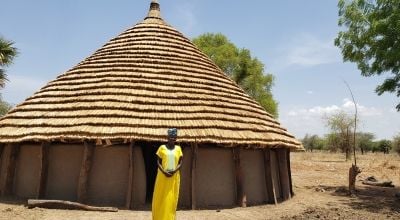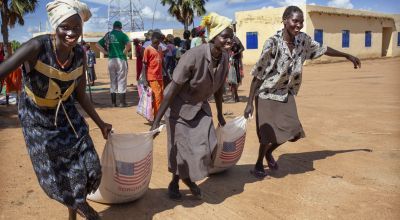
Read our 2024 annual report

Knowledge Hub
Angelina’s daughters are children of the flood.
Nyachar, three years old, and Chaudiel, four, have only known their homeland as an archipelago.
Since 2021, large swathes of South Sudan have been under water. Unity State, where Angelina and her family live, has been worst affected. Communities survive on the high ground, cut off from services, and each other, by the flood waters.
“I also have two other boys at home,” says Angelina, “but the ones who have been severely affected by malnutrition are my two daughters. The boys were born before the flooding crisis, when we still had our cattle and goats. They grew up eating very well, and they have become strong. The unlucky ones are my small girls.”
When families lose land, livestock, and livelihoods, parents struggle to feed their children. Between April and July 2024, during the rainy season, it is estimated that 7.1 million people in South Sudan experienced severe acute food insecurity. This represents 56% of the total population.

The water lily
“Before, life was so much better than today. This is because we had our cattle, our goats, and we could depend on them for milk. And we also had enough fertile land that we would plant all the good vegetables. We did not even know of the water lily before.”
Facing starvation, Angelina has resorted to feeding her children the bulb of the water lily, the only plant thriving in the flooded fields.
“Until Nyachar was six months old, she was fully dependent on breast milk. When she grew older, she needed other meals. But I am not able to provide this to her. We have been depending on the water lily. The bulb of it is so dark, we don’t even like how it looks. Once you eat it, you feel sick, and you have diarrhoea. And we are drinking water from the river as well. This is how our life is.”
Without clean water, for both drinking and washing, children fall ill. Waterborne disease, such as diarrhoea, is an aggravating factor in acute malnutrition.

“They could not even talk”
Angelina is sitting inside the Chotyiel Primary Health Care Centre in Guit County, Unity State. The Centre is operated by Concern Worldwide, with funding from the European Union.
Sitting beside her on the colourful ground mat are her daughters, Nyachar and Chaudiel. The girls are familiar with the Centre by now. Chaudiel was the first to fall ill, three months before. She was treated for acute malnutrition, recovered, but has since relapsed. Nyachar has been suffering for the past two weeks; “She was very weak, and she was having a lot of diarrhoea. She was given plumpy nut and now, I have seen her health improve.”
Plumpy’ nut is a high-nutrient peanut paste, administered by health workers to children suffering acute malnutrition.
“We are grateful for the Plumpy' nut. Once my baby wakes up in the morning, she eats Plumpy’ nut, and then goes outside to play. It is not like before. You can see for yourself; they are playing right now. Before this, they were suffering. They could not even talk, walk, or even wake up. They were just sleeping the entire time.”

To support her family, Angelina used to gather and sell firewood. “I would make around 200 South Sudanese Pounds [the equivalent of €1.40]. I would take that money and buy salt, so we could put it on the water lily. But I broke my hand one month ago. I had to climb a tree to get firewood, and I fell, and landed on my hand. Now I am not able to get food for my children. This is why Chaudiel has relapsed.”

As well as screening and treating malnutrition in women and children, the health workers at the Chotyiel Primary Health Care Centre inform parents of good hygiene and nutrition practices. Information sessions help mitigate against the spread of disease and encourage more timely intervention for illness and malnutrition.
“I am very happy. We have learned a lot, including how to wash our hands after the toilet and before preparing food, and how to use the MUAC band at home.”
The Middle-Upper-Arm-Circumference (or MUAC) band is wrapped around the arm of a child. Once fitted snugly, the band indicates the nutrition status of the child. If the band stops at red, the child is suffering from acute malnutrition.

“Now we don’t just come to the health centre, we measure our children at home, and then decide if we will take them."
During the one-year duration of the programme, Concern staff at Chotyiel treated 2,400 malnourished children aged five and under. Additionally, nearly 1,600 pregnant and breastfeeding women were treated for the same. Just under 9,000 parents, and other caregivers, received the type of counselling on improved hygiene and sanitation which Angelina described. And, as always, life goes on: Trained midwives made 364 safe deliveries.
“The health workers are really helping us in our daily life, and we appreciate that they are here with us in our community.”






